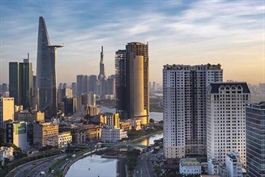Stimulus plan brings property positivity
Stimulus plan brings property positivity
While 2021 was a year of unsustainable growth in the real estate market, this year economic stimulus packages, foreign investment flow, and domestic funding transformation could make the sector more active.

In December at a seminar on the real estate market, Tran Hong Phuc, general director of Phuc Hung Holdings Construction JSC, said that a new government stimulus package would create more jobs and opportunities for the business community when officially put into operation. “The economy will develop better and this will reflect back to every company and create more favourable conditions for business to recover,” Phuc said.
The $15 billion stimulus package, or 3.2 per cent of GDP, approved by the National Assembly in January, will focus on socioeconomic development to foster recovery. Around $7.6 billion from this package will be poured into investment and development, mainly for infrastructure improvements.
“The stimulus package will promote public investment, so to be effective, the compensation and clearance work must be implemented quickly. When the stimulus package is launched, investment activities will be more drastic,” Phuc emphasised.
The real estate and banking sectors are still the focus of investors, with many stocks continuously increasing. Vietnam is also pursuing an economic recovery strategy similar to many other economies.
Accordingly, the package for 2022-2023 includes four component programmes, some of which will affect real estate and building materials: the master plan on opening up the economy associated with COVID-19 prevention and control; one on social security and employment; one to restore enterprises, cooperatives, and business households; and another to develop infrastructure and unlock social resources.
The new adjusted capital and share purchases by foreign investors reached $31.15 billion as of December 20, up 9.2 per cent annually, in which real estate ranked third with $2.6 billion. This figure shows that despite the strong impact of the pandemic, Vietnam is still an attractive destination for foreign direct investment (FDI), as reported by the Foreign Investment Agency.
Previous reports by several market research consultants also stated that foreign investors still carried out many mergers and acquisitions in housing projects and industrial real estate. The largest manufacturing plants in the first half of 2021 in Quang Ninh and Bac Giang provinces were mostly funded by Hong Kong and Singaporean investors.
The context of the pandemic has allowed many foreign investors to solve the problem of the scarcity of clean land and the continuously escalating land prices for the past three years. They are very active in cooperating with domestic real estate corporations in large-scale projects.
In addition, foreign investors highly appreciate the foundations in Vietnam, such as labour, the fast and robust development of infrastructure in big cities, and the government’s supportive policies for enterprises. These have created attractive investment opportunities that caused foreign capital to flow in. At the same time, when the economy gradually recovers, good planning, developed infrastructure, a golden population structure, and middle class growth will be a significant driving force for the real estate market, the experts insist.
According to property consultants Savills Hong Kong, Vietnam remains an attractive investment destination for overseas investors in particular as the world attempts to open back up. In the complicated movements of the pandemic, Vietnam is the only country in the world to be upgraded to a positive rating by Moody’s, S&P, and Fitch.
Meanwhile, Pham Lam, deputy chairman of the Vietnam Association of Realtors (VARS), said that the pandemic is an opportunity for real estate businesses to review their activities, product quality, development capacity, and how to be able to offer reasonable prices for end-users.
Figures from the VARS show that a huge number of related businesses had to close for some time due to the impacts stemming from the pandemic. However, many Vietnamese businesses are showing perseverance and persistence with development model changes and accelerating the digitisation process in operations. Many businesses have actively participated with local authorities in fighting the pandemic, such as Vingroup, Hung Thinh Group, Dai Phuc Group, and many others.
Ho Chi Minh City, meanwhile, is to set up one million units for lower-income people. “This is not only an opportunity for developers to benefit, but also to show their responsibility to society,” said Lam from the VARS.
























